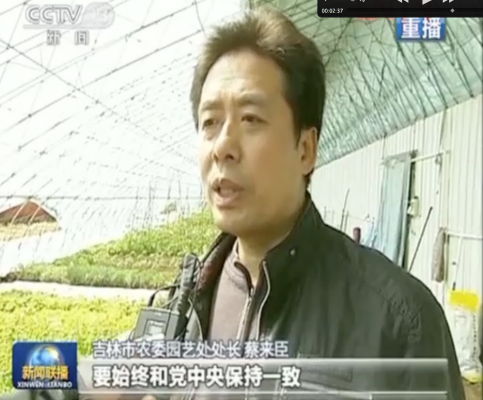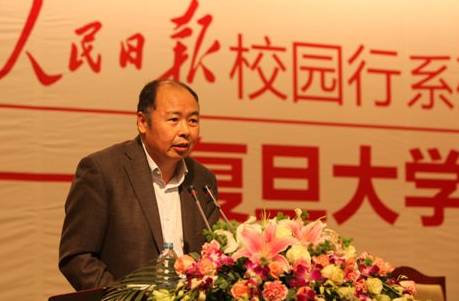Back on April 11 and 13, two separate CMP posts looked at how the official line from the CCP’s Central Committee on the Bo Xilai (薄熙来) case had been forcibly jammed into Chinese media of all stripes — from Nasdaq-listed commercial websites to major market-driven metro newspapers and subsidized Party “mouthpieces.” Everyone had to run the Party’s version of the top news prominently.
As I told The New York Times late last week, “We haven’t seen this kind of direct meddling with the media across the board in a long, long time.” And we certainly have not seen the sort of biaotai (表态) — or affirmation of loyalty toward the central leadership — that we have seen in recent weeks on China Central Television and in local Party paper editorials since the aftermath of the crackdown on democracy demonstrators in Beijing in June 1989.

[ABOVE: A local Party cadre says on the official nightly newscast on April 11 that “all local Party cadres must maintain unity with the Central Committee of the CCP through and through.”]
We may speculate over whether the shift in the political winds in recent weeks will or will not bring substantive change on key issues like political reform. But certainly the politics we have seen at play in the Bo case hearken back to the past, not to the future. This is old-style power politics — and it’s the factions or alliances that happen to hold sway that get to control the news coverage.
For China’s Party-run media, apparently, the recent success of the imposed monopoly of the Party line on the Bo Xilai story is a source of pride.
The Oriental Morning Post, a leading commercial newspaper in Shanghai, reports today on a talk given at Fudan University this week by Zhang Yannong (张研农), the director (or top Party official) at the CCP’s official People’s Daily.
In his talk, “The People’s Daily‘s Historical Undertaking and Pursuit of Innovation” (《人民日报的历史担当与创新追求》), Zhang spoke openly about how editorials in the People’s Daily had “set the tone” (确定了基调) for the Bo Xilai affair and had “served to create unity of thought for the Party and nation, and to reassure the public and stabilize the overall situation.”
In its treatment of the Bo Xilai affair, Zhang added, the People’s Daily had “shown a powerful capacity for channeling public opinion, and had had great value.” Moreover, it should be “written into political history and journalism history.”

[ABOVE: Zhang Yannong, the director of the CCP mouthpiece People’s Daily, tells an audience at Shanghai’s Fudan University that the paper made “political history” with its “channeling” of the Bo Xilai affair.]
The following is a portion of Zhang Yannong’s speech at Fudan University:
Most recently the news that has gotten the most attention concerns the Bo Xilai affair. In propaganda and reporting on this story, the People’s Daily, and particularly the editorial section of the People’s Daiy, played an important role. If you opened the April 11 edition of any newspaper, whether it was a paper paper or a metropolitan newspaper, they basically all ran the People’s Daily editorial “Strongly Supporting the Correct Decisions of the Party’s Central Committee“. The two editorials that followed, “Conscientiously Safeguarding a Good Situation for Stable Reform and Development” and “Conscientiously Observing Party Discipline and National Laws”, also had an immense impact.
These three opinion pieces were done within a period of two days by a pair of young “post-80s” [writers] under the direction of the head of our editorial department. Aside from these three opinion pieces, we also successively ran eight related editorials in the “Today’s Topic” column on the front page. If we can say that the news releases [from Xinhua News Agency] were only about relaying information, then these editorials were about setting the tone. To a great extent, they served the purpose of uniting the thoughts and understanding of the Party and the nation [on the Bo Xilai affair], reassuring the public and stabilizing the overall situation. These reports and articles made the situation known in a timely manner, and also offered timely viewpoints, having a powerful public opinion channeling capacity, and vested with high political value, news value and practical relevance. They should be written into political history, and into the history of journalism. The role played by the People’s Daily during this affair has illustrate very well that the People’s Daily is still the first and foremost representative of mainstream public opinion (主流舆论) in our country.




















